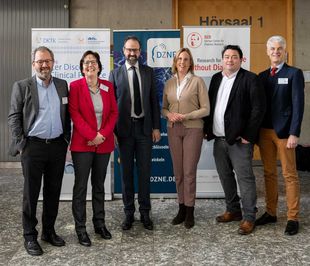In the individual centers, scientists from university and non-university research institutions are working together on an interdisciplinary basis to rapidly bring new research results into application. This is necessary since the number of individuals suffering from or newly diagnosed with widespread diseases such as cancer, metabolic or neurodegenerative diseases remains alarmingly high.
Despite their different research areas, the three centers have much in common when it comes to developing new therapeutic approaches or research methods. The long-term networking that has now existed for many years at the Dresden site offers outstanding opportunities to jointly develop new innovative research strategies.
The Joint DZG Symposium Dresden, which took place for the sixth time on 26 March 2024 was mainly hosted by the DKTK this time. The symposium, designed as an exchange platform for Dresden scientists and clinicians, was held at the MTZ this year with over 100 participants.
The importance of the DZGs for the Free State of Saxony was underlined by the participation of the Saxon State Minister for Science, Sebastian Gemkow, who gave a welcoming speech in addition to Esther Troost, Dean of the Faculty of Medicine at TU Dresden and Mechthild Krause, spokesperson for the DKTK.
The three spokespersons of the DZGs (Mechthild Krause, Michele Solimena and Gerd Kempermann) subsequently gave brief presentations on their institutions and current research work. Gerd Kempermann concluded by taking the opportunity to thank our long-standing ministerial supporter, Dr. Annerose Beck, on behalf of all those present for her unwavering and tireless commitment to the Dresden DZGs.
In his presentation on the national activities of the German Centers for Health Research, Triantafyllos Chavakis spoke about a groundbreaking immunological project that has now been awarded the DZG Innovation Fund in a further step, to which researchers from the various thematic DZGs have been able to apply jointly for research funding since 2022.
DZG-overarching research projects
We have already implemented this concept of DZG-overarching research projects locally since 2020 with a popular and successful seed funding of cross-DZG projects, which are intended to promote new translational activities between the Dresden DZGs. At this year's symposium, the awardees of the last funding round (Franziska Baehnke, Annette Garbe and Mike Karl as well as Rebecca Rothe and Anne Eugster) had the opportunity to present the progress of their projects to the audience.
Naturally, the 1-minute poster flashtalks were also a must this year. 19 young scientists took the opportunity to present their projects briefly and concisely. Afterwards, the conference participants had time to talk to the young scientists over a cup of coffee.
This year's keynote presentation was given by Prof. Jakob N. Kather (EKFZ Dresden). With his lecture on "AI in medicine", he gave a fascinating insight into the possible applications and still existing limitations of artificial intelligence in medical diagnostics and therapy.
Finally, Gerd Kempermann had the pleasure and honor to open the next call for proposals for the DZG-overarching project applications and to invite to the next 7th Joint DZG Symposium Dresden at the DZNE in 2025.

